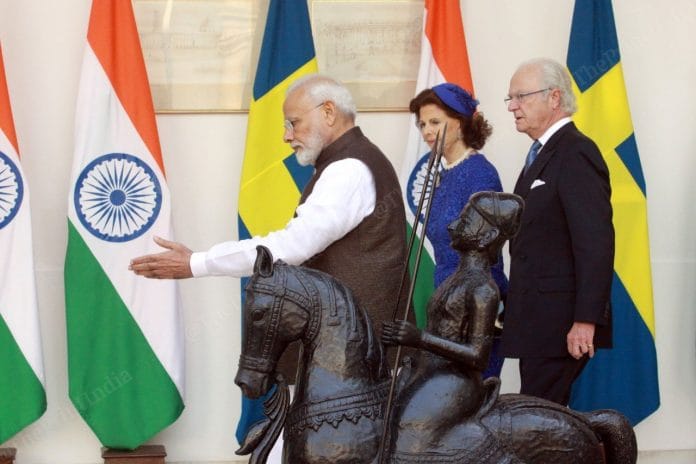New Delhi: India sought to address Sweden’s concerns on Kashmir by informing Stockholm about the steps being taken to bring normalcy back to the Himalayan region. At the same time, New Delhi also highlighted the challenges it is facing due to terrorism fomented from across the border with Pakistan.
According to sources, the issue came up during a meeting between External Affairs Minister S. Jaishankar and his Swedish counterpart Ann Linde, who arrived in India Monday as part of Swedish King Carl XVI Gustaf and Queen Silvia’s entourage.
Sweden, a major advocate of human rights in the European Union, was only given a readout on what India is planning to do in the Kashmir Valley after the scrapping of Article 370, sources told ThePrint.
Among other things, New Delhi told Stockholm about the steps taken so far, including the restoration of landline connectivity and postpaid mobile services, the sources said.
In a tweet that followed the meeting, Jaishankar said the two sides also discussed the “challenges of terrorism, especially cross-border terrorism”.
“Emphasised that right to life is the most basic human right. Agreed to work together in international forums to address this key challenge of terrorism,” he said.
He added that both sides shared a “strong identity of views on multilateralism” and agreed on a new consultation mechanism.
India and Sweden have also agreed to “cooperate closely in the @UN”, Jaishankar tweeted.
Discussed challenges of terrorism, especially cross-border terrorism. Emphasised that right to life is the most basic human right. Agreed to work together in international forums to address this key challenge of terrorism.
— Dr. S. Jaishankar (@DrSJaishankar) December 2, 2019
Days before her visit to India, Linde raised concerns on the human rights situation in Kashmir while speaking in the Swedish parliament, the Riksdag.
“The situation in Kashmir is worrying and the government is closely following developments… We emphasise the importance of respect for human rights, that an escalation of the situation in Kashmir is avoided and that a long-term political solution to the situation must involve Kashmir’s inhabitants,” she said.
She also called for the lifting of restrictions imposed in the Valley after the scrapping of Article 370, which gave the erstwhile state of Jammu & Kashmir a degree of autonomy.
While many restrictions have since been eased, Kashmir remains without internet nearly four months since Article 370 was scrapped on 5 August.
Saying that a “dialogue between India and Pakistan is crucial”, Linde added, “Together with the EU, Sweden is closely following the changes that have taken place in Jammu & Kashmir’s constitutional status and notes information that has emerged about how the development affects the situation for human rights.”
Also read: India-Sweden ties have seen ups and downs — Kashmir is the latest example
Sweden eyeing India’s fighter-jet programme
Although the Swedish king is a ceremonial head, his visit to India is expected to boost the strong business ties between both countries.
The king had last visited India in 2005. On the first day of his visit Monday, he called on President Ram Nath Kovind and also met Prime Minister Narendra Modi.
Sweden is now keen to sell its indigenous warplanes, Gripen, to the Indian Air Force, with its eyes on India’s $15 billion contract for 114 fighter jets, sources said.
Micael Johansson, president and CEO of SAAB, the maker of Gripen fighter jets, is part of the king’s delegation and expected to take forward talks to produce the jets in India under the ‘Make in India’ programme.
SAAB had last year announced a joint venture with the Adani Group, which reportedly aimed to make the jets in India if the Gripen deal was sealed.
However, it faces stiff competition from America’s Lockheed Martin and Boeing, which have also fielded their planes for the competition.
Also read: Sweden’s King Carl XVI Gustaf and Queen Silvia in India for 5-day visit







Terror excuse is Indian ” mantra” which it is using to convince the world leader but no one is listening.
Only if you had access to foreign print media you would be staring at the word ‘terror’ written in BIG BOLD letters as you passed newsstands.
Having lived in the EU, Swedish concern doesn’t come as a surprise to me. Some of the European countries have travelled a long distance on human rights. Sweden is one of them. In fact even the United Kingdom has high standards in human rights, but now realising that a carte blanche on human rights is not possible. For instance, the ISIS bride with child was denied re-entry into the UK, and now MPs across party lines have agreed to give preference to national security over human rights in terror related cases. These EU countries have almost resolved all issues with their neighbours all of whom are ideologically identical, coming from the same Christian faith. These countries clearly understand what Islamist threat means, but since they are steadfast believers in human rights, they are inclined to include HR in their dialogue. There is no reason why a middle ground cannot be reached. However, it should stop short of a dialogue with Pakistan at least in the near future. India’s foreign policy is in able hands.
Normally, a small country with little geopolitical heft, hoping to conclude a $ 15 billion arms deal would start the conversation by saying it supports India’s claim to a permanent seat on the UNSC. The fact that Sweden is speaking about the internal situation in Kashmir, human rights, the wishes of the Kashmiri people, the need for a dialogue with Pakistan should give our diplomacy pause.
Diplomacy is like a dance, 2 people step forward, step back, step sideways, however both still move together. Btw Talk with Pakistan = bilateral talks, which is India’s stand.